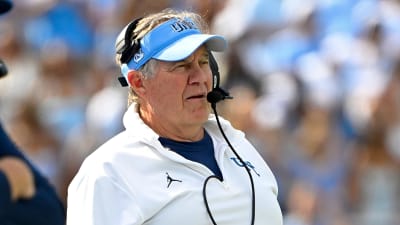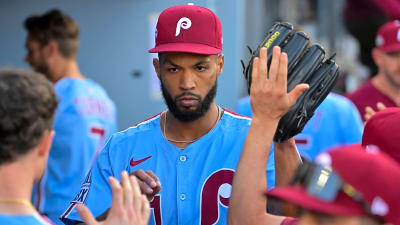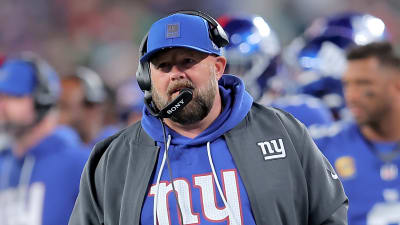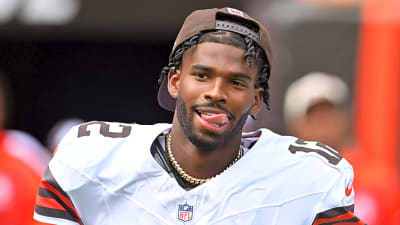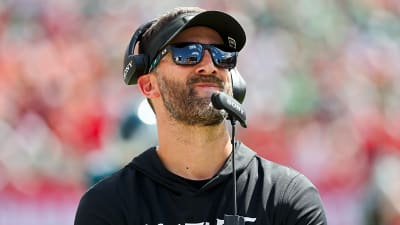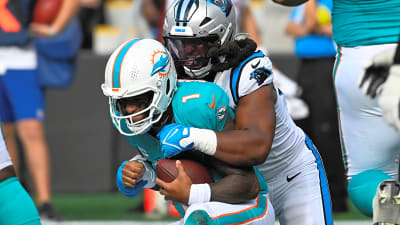NASHVILLE—Perhaps Tim Corbin saw it within him, but Jason Esposito was naive to the idea that he could be a Vanderbilt guy. He sat down and took the meeting with Corbin in Bethany, Connecticut, alongside his parents, but the pitch didn’t seem to align with what Esposito was looking for.
Corbin knew that Florida was on Esposito’s radar and that the “academic side of things wasn’t something that was all that appealing” to him as a teenager. He wanted to get his foot in the door, though.
Over 17 years, three seasons at Vanderbilt, a professional career, a master’s degree in kinesiology, a marriage and two kids later, Esposito still remembers his mom Roseann Esposito’s takeaway from that meeting.
“Corbin really cares,” she said at the time.
What ultimately got Esposito to buy in to what Vanderbilt was selling in 2008 wasn’t all that different from what convinced him to come back as Vanderbilt’s hitting coach in 2025.
Esposito has remained in touch with Corbin since he departed from Vanderbilt’s program in 2011 and had talked to the Vanderbilt coach about a vacant hitting coach position in the past, but “couldn’t take the job.” He never forgot about the opportunity, though.
“There’s places that just hold special places in your heart and this is one of them,” Esposito told Vandy on SI. “I always said to myself ‘if it ever comes around again boy would I be so excited to have that opportunity and make the most out of it.’ It just happened to work out and I'm very thankful for that.”
Corbin says that Esposito is “certainly the right person” for the job, but that it was always a matter of finding the right time for him to rejoin the program that he’d grown up in.
Vanderbilt’s offense finished the 2025 season ranking second to last in batting average in the SEC, with the fourth-lowest number of home runs in the league and the second-lowest slugging percentage in the conference. The Commodores took the No. 1 overall seed, but ultimately paid for their offensive struggles as they fell in a regional for the fourth-consecutive season.
When its hitting coach Jayson King departed from the program in the following weeks, Corbin knew who his guy was.
Corbin says the most appealing thing about Esposito as a candidate was his “connectivity” and ability to level with players. The Vanderbilt hitting coach is far from bombastic, but his presence has a place within this program. Corbin says that he can be “off to the side listening to” Esposito and that he’s “always very impressed” by what he hears.
It’d be irresponsible for Corbin to evaluate hitting coach candidates solely off of their ability to connect, but when Esposito’s rèsumè–which includes eight seasons within the Cleveland Guardians organization and an eventual role as its major league assistant hitting coach–and proficient use of analytics checked out, Corbin was sold.
“It was appealing,” Corbin said of Esposito’s other traits, “But, I think what’s appealing more is the connectivity of the person. It’s great to be very intelligent, very smart, but if you can’t connect with the people then it makes it very difficult.”
King was often regarded as a connector within Vanderbilt’s program and was generally well liked, sources indicated to Vandy on SI, but his approach was considered to be more old-school in terms of individual player development.
Under the former Vanderbilt hitting coach, its offense became significantly more talented and played its best baseball down the stretch of SEC play, but it was lacking the embrace of some aspects of modern hitting. Those days are no longer for this program.
“I feel like that’s something that we haven’t really made a huge focus here in the past,” Vanderbilt utility man Braden Holcomb said. “[Esposito] talks a lot about the analytical side, which is good. Another good thing he does is the analytical side, especially as a person who’s playing the game, it can be a little confusing, but he does a great job kind of breaking everything down and making sure that you truly understand what he’s trying to get across.”
In a similar way to the ineffectiveness of intelligence without connectivity, analytical knowledge without an ability to communicate it is often futile. Those within and surrounding the Cleveland Guardians organization throughout Esposito’s tenure often raved regarding his ability to take complicated or an overwhelming amount of metrics and “package” them into practical things for hitters to take note of.
As of the beginning of the fall, Vanderbilt had mostly looked at analytics as a group. Its players have appeared to take some things in as a result of the data points that Esposito has brought to light.
As Esposito takes the reigns of Vanderbilt’s offense, he doesn’t want the misconception that he’s only a data guy to pervade the perception of him, though. The first-year Vanderbilt hitting coach values analytics more than King did in the same role, but says his job includes “a blend” of feel and leaning on data to make decisions.
Perhaps older-school baseball guys that often labor away in a game that has consumed their life without a familiarity with some of the data that Esposito utilizes get a bad rap, but the Vanderbilt hitting coach wants to clarify coaches of that archetype still have a place in the game.
Those veterans were often paired with a group of staff members on the cutting edge of analytics and how to use them. Esposito believes part of the reason for his rise to Vanderbilt's hitting coach was a result of him developing in the right place at the right time.
“I was lucky enough to get into professional baseball when the technologies were just coming out and some of the information was just starting to get fed through our organization,” Esposito said. “You start to learn what you need to look at or what information tells the story that you need the player to understand.”
Esposito says that Vanderbilt’s coaching staff has “tried to take a team approach” as opposed to an individual one and that his group has “embraced challenges” while attempting to grow in the "uncomfortable environments” that he’s used in the batting cage or in on-field batting practice. At this stage, he says he’s focused on “laying out” reasons to the players as to why he's approaching things a certain way and establishing an open dialogue with them.
Sometimes that includes a more advanced use of analytics that Vanderbilt has had in the past, sometimes it doesn’t.
“We’re just kind of using objective means to help players grow and get better, not necessarily feeding them a bunch of data,” Esposito said. “If anything, the data is coming from ‘hey, this is what leads to run scoring’ and we’re trying to simplify that as much as possible and make it our team philosophy.”
Esposito says he’s “super excited” about working with Vanderbilt’s core of returning hitters and their willingness to “attack things head on,” but he knows that they’ve got room to go if this Vanderbilt program is going to get back to where he and Corbin know it can be.
The Vanderbilt hitting coach cites sophomore infielder Brodie Johnston’s need to strike out less and walk more. He says that Holcomb’s next step comes with more consistency. If his methods are going to pay off with results, everyone will have the same result that he hopes Holcomb does.
Esposito isn’t changing this program into a flashy one, instead he’s embracing what it already is. He just wants more of it.
“Consistency,” Esposito says, “It’s what we’re looking for from all of our players and with more consistency we can be executing our plan, hitting balls hard. I think you’re gonna see a lot of growth with players who are going to kind of take the next step in their development.”
More must-reads:
- Three questions facing the St. Louis Cardinals this offseason
- Biggest questions for Dodgers, Brewers heading into NLCS
- The 'MLB playoff debut strikeouts leaders' quiz
Breaking News
Trending News
Customize Your Newsletter
 +
+
Get the latest news and rumors, customized to your favorite sports and teams. Emailed daily. Always free!

